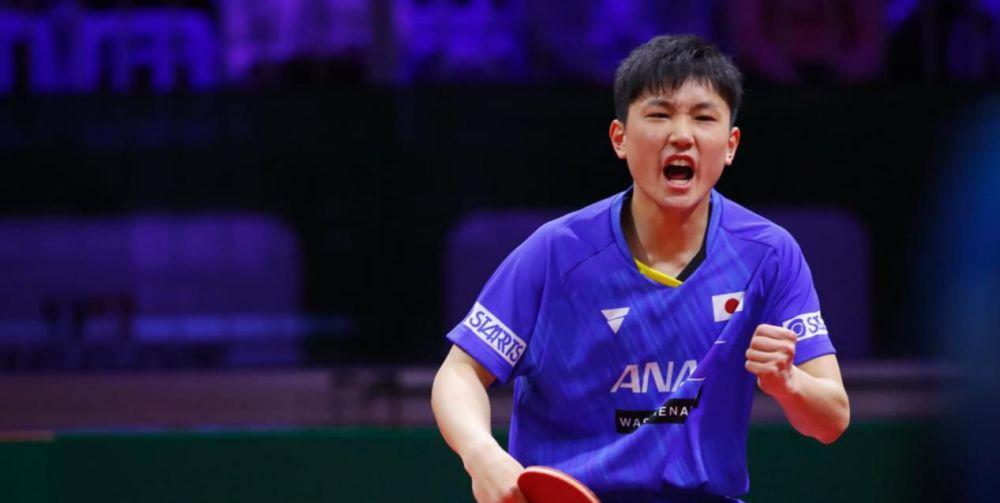Just after the national table tennis ended the WTT Macau tournament, the strongest opponent of the national table tennis, Japan, also began to hold the annual All Japan Championships.
As we all know, in order to compete with national table tennis, they began their own generation plan as early as the Rio Olympic cycle, that is, they gave up a group of athletes who had already formed, and began to focus on cultivating younger players.
Among them, Tomokazu Zhang, Mimachi Ito, and Miyu Hirano are very good young athletes produced by the Generation Break Program.

In particular, Japan's Ito Mimachi, at a young age, won the mixed doubles championship at the Tokyo Olympic Games at the age of 20, and also created the history of Japanese table tennis.
Perhaps from the generation plan to taste the sweetness, today's Japanese table tennis continues to increase the training of young athletes, every year at the All Japan Championships, we can see many very young athletes in their teens take to the field.
Don't underestimate these very young athletes, they also have great strength.
No, in the mixed doubles match of the All Japan Championships, the runner-up of the World Table Tennis Championships, Zhang Benzhihe, was almost upset in the first game, and almost encountered a round trip.
What's going on here? Let's take a closer look.
As we all know, in the Tokyo Olympic cycle, the ace combination of Japanese table tennis in the mixed doubles is the ito Mizutani Hayabusa pair, they achieved very good results in the Tokyo Olympic cycle, and even defeated China's Liu Shiwen and Xu Xin in the Tokyo Olympic Games to win the first Olympic gold medal in the history of Japanese table tennis.
However, after winning the championship, Mizutani Hayabusa announced his retirement due to age and injury reasons.
After Hayabusa Mizutani retired, Ito Did not find a suitable mixed doubles partner for the time being, and Ito Puto put more energy into the women's singles and women's doubles projects, so that the Japanese table tennis side re-cultivated a pair of mixed doubles combinations, that is, Zhang Benzhi and Hayata Hina combination.
Zhang Benzhi and Hayata Xina have also achieved good results since pairing mixed doubles, they reached the mixed doubles final at last year's Houston World Table Tennis Championships, but in the final they lost to Sun Yingsha Wang Chuqin's combination and won the mixed doubles runner-up of the World Table Tennis Championships.
It is said that in terms of strength, Zhang Benzhi and Hayata Hina are still very strong, but in the first mixed doubles match of the All Japan Championship, they were on the verge of being upset.
Zhang Benzhi and Hayata Shina had a first-round bye in the all-day tournament, and in the second round, they met the unknown Izumo Takuto/Chiba Naozuki.
In the first set, zhang Benzhi and Hayata Xina played a fairly normal combination, winning the first set with a score of 11-8.
However, from the second set of the match, Izumo Takuto / Chiba Naotsu played very fiercely, frequently taking the initiative to attack, and finally equalized the score with a score of 13-11.
In the third set, Zhang Benzhi and Hayata Hina regained control of the rhythm of the field, and in the game, Zhang Benzhi and Hayata Hina cooperated more tacitly, and easily won another set with an 11-4 score.
But in the fourth set, Zhang Benzhi and Hayata Hina once again lost a set 9-11.
The two sides fought fiercely to the decider, but in the decider, Zhang Benzhi and Hayata Hina were still superior in strength, and finally ended the battle with a score of 11-7.
Judging from this game, in the All Japan Championship, it cannot be ignored that any team member, even a very unknown athlete, may completely beat some of the main players.
At the same time, Zhang Benzhihe's sister Zhang Benmeihe was also in the mixed doubles, and his partner Tian Tianjiantai swept the opponent 3-0 to advance to the second round.
It can be seen that Japanese table tennis has indeed made some efforts in the cultivation of young players, and compared with national table tennis, Japanese table tennis players are younger and more aggressive.
For the national table tennis, it is also necessary to increase the training of young athletes, and it is impossible to rely on several old athletes who have exceeded 30 years old.